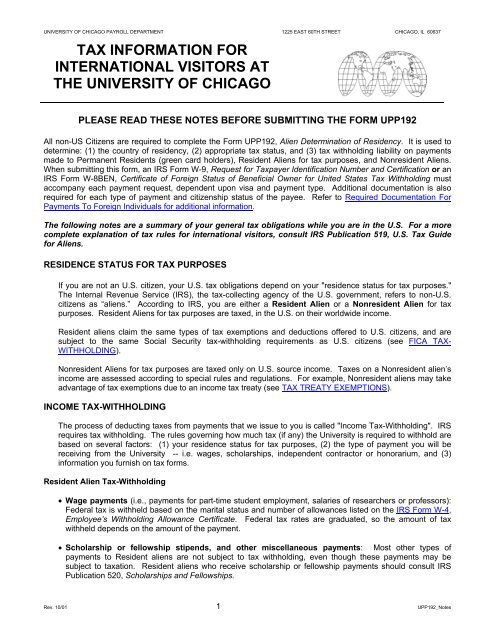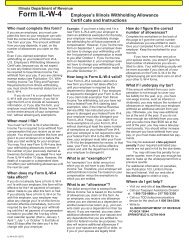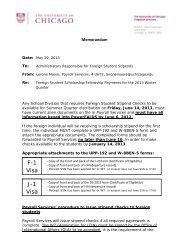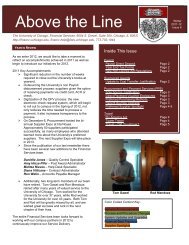UPP 192 Instructions - University of Chicago
UPP 192 Instructions - University of Chicago
UPP 192 Instructions - University of Chicago
Create successful ePaper yourself
Turn your PDF publications into a flip-book with our unique Google optimized e-Paper software.
UNIVERSITY OF CHICAGO PAYROLL DEPARTMENT 1225 EAST 60TH STREET CHICAGO, IL 60637<br />
TAX INFORMATION FOR<br />
INTERNATIONAL VISITORS AT<br />
THE UNIVERSITY OF CHICAGO<br />
PLEASE READ THESE NOTES BEFORE SUBMITTING THE FORM <strong>UPP</strong><strong>192</strong><br />
All non-US Citizens are required to complete the Form <strong>UPP</strong><strong>192</strong>, Alien Determination <strong>of</strong> Residency. It is used to<br />
determine: (1) the country <strong>of</strong> residency, (2) appropriate tax status, and (3) tax withholding liability on payments<br />
made to Permanent Residents (green card holders), Resident Aliens for tax purposes, and Nonresident Aliens.<br />
When submitting this form, an IRS Form W-9, Request for Taxpayer Identification Number and Certification or an<br />
IRS Form W-8BEN, Certificate <strong>of</strong> Foreign Status <strong>of</strong> Beneficial Owner for United States Tax Withholding must<br />
accompany each payment request, dependent upon visa and payment type. Additional documentation is also<br />
required for each type <strong>of</strong> payment and citizenship status <strong>of</strong> the payee. Refer to Required Documentation For<br />
Payments To Foreign Individuals for additional information.<br />
The following notes are a summary <strong>of</strong> your general tax obligations while you are in the U.S. For a more<br />
complete explanation <strong>of</strong> tax rules for international visitors, consult IRS Publication 519, U.S. Tax Guide<br />
for Aliens.<br />
RESIDENCE STATUS FOR TAX PURPOSES<br />
If you are not an U.S. citizen, your U.S. tax obligations depend on your "residence status for tax purposes."<br />
The Internal Revenue Service (IRS), the tax-collecting agency <strong>of</strong> the U.S. government, refers to non-U.S.<br />
citizens as “aliens.” According to IRS, you are either a Resident Alien or a Nonresident Alien for tax<br />
purposes. Resident Aliens for tax purposes are taxed, in the U.S. on their worldwide income.<br />
Resident aliens claim the same types <strong>of</strong> tax exemptions and deductions <strong>of</strong>fered to U.S. citizens, and are<br />
subject to the same Social Security tax-withholding requirements as U.S. citizens (see FICA TAX-<br />
WITHHOLDING).<br />
Nonresident Aliens for tax purposes are taxed only on U.S. source income. Taxes on a Nonresident alien’s<br />
income are assessed according to special rules and regulations. For example, Nonresident aliens may take<br />
advantage <strong>of</strong> tax exemptions due to an income tax treaty (see TAX TREATY EXEMPTIONS).<br />
INCOME TAX-WITHHOLDING<br />
The process <strong>of</strong> deducting taxes from payments that we issue to you is called "Income Tax-Withholding". IRS<br />
requires tax withholding. The rules governing how much tax (if any) the <strong>University</strong> is required to withhold are<br />
based on several factors: (1) your residence status for tax purposes, (2) the type <strong>of</strong> payment you will be<br />
receiving from the <strong>University</strong> -- i.e. wages, scholarships, independent contractor or honorarium, and (3)<br />
information you furnish on tax forms.<br />
Resident Alien Tax-Withholding<br />
• Wage payments (i.e., payments for part-time student employment, salaries <strong>of</strong> researchers or pr<strong>of</strong>essors):<br />
Federal tax is withheld based on the marital status and number <strong>of</strong> allowances listed on the IRS Form W-4,<br />
Employee’s Withholding Allowance Certificate. Federal tax rates are graduated, so the amount <strong>of</strong> tax<br />
withheld depends on the amount <strong>of</strong> the payment.<br />
• Scholarship or fellowship stipends, and other miscellaneous payments: Most other types <strong>of</strong><br />
payments to Resident aliens are not subject to tax withholding, even though these payments may be<br />
subject to taxation. Resident aliens who receive scholarship or fellowship payments should consult IRS<br />
Publication 520, Scholarships and Fellowships.<br />
Rev. 10/01 1 <strong>UPP</strong><strong>192</strong>_Notes
Nonresident Alien Tax-Withholding<br />
• Wage payments: In order to receive wages, Nonresident aliens must have a valid US social security<br />
number. Nonresident alien employees must follow special instructions when completing the IRS Form W-4.<br />
Nonresident aliens must list themselves as “SINGLE” (regardless <strong>of</strong> actual marital status), with “1”<br />
allowance, and request an additional amount <strong>of</strong> federal tax to be withheld from each check. Currently this<br />
“additional amount” is $15.29 for employees paid on the biweekly pay schedule, or $33.13 for employees<br />
paid on the monthly pay schedule.<br />
In addition to the Federal tax withholding, the <strong>University</strong> also withholds state income tax. Illinois state tax is<br />
generally withheld at the rate <strong>of</strong> 3%.<br />
• Scholarship or fellowship stipends, and other miscellaneous payments: Scholarship or fellowship<br />
stipends paid to Nonresident aliens are subject to a 14% federal tax-withholding rate. Other miscellaneous<br />
payments to nonresidents are generally subject to a flat 30% federal tax-withholding rate (see TAX<br />
TREATY EXEMPTIONS)<br />
FICA TAX-WITHHOLDING<br />
Social Security tax (also know as FICA) is an employment tax. FICA is withheld only from wage payments,<br />
and is deducted in two components: Old Age, Survivors, Disability Insurance or OASDI (6.20%) and Medicare<br />
(1.45%). FICA taxes will not be withheld from a student's wages when the student is registered and attending<br />
classes at the <strong>University</strong> <strong>of</strong> <strong>Chicago</strong>, and works on a part-time basis.<br />
FICA tax exemption for certain Nonresident aliens: Students who hold F-1 or J-1 classifications are<br />
exempt from FICA tax withholding for the first five calendar years they are in the U.S. Pr<strong>of</strong>essors and<br />
researchers who hold J-1 classification are exempt from FICA tax withholding for the first two calendar years<br />
they are in the U.S. It is the Payroll Department's responsibility to determine which employees should be<br />
subject to FICA tax withholding during a particular calendar year.<br />
Note: The term calendar year refers to the period <strong>of</strong> January 1 through December 31. If you are present in<br />
the U.S. during any part <strong>of</strong> a particular calendar year, that year will count as one calendar year <strong>of</strong> U.S.<br />
presence.<br />
TAX TREATY EXEMPTIONS<br />
Certain international visitors may be able to claim exemption from U.S. taxes based on a tax treaty agreement<br />
between the U.S. and their home country. You should consult IRS Publication 901, U.S. Tax Treaties to see<br />
if a treaty between the U.S. and your country <strong>of</strong> residence actually exists. If a treaty does exist, you should<br />
determine if an article <strong>of</strong> the treaty covers the type <strong>of</strong> payment you will be receiving from the <strong>University</strong>, and if<br />
you will be able to meet all the requirements <strong>of</strong> the treaty. If a tax treaty article does exist, and covers the<br />
type <strong>of</strong> payment you will receive, you may claim the exemption from tax when you file your U.S. income U.S.<br />
tax return treaty (see TAX FILING).<br />
The IRS also allows you to claim tax exemption before the payment is made to you. To claim the exemption<br />
from tax withholding, you must either have a permanent social security number (SSN) or an individual<br />
taxpayer identification number (ITIN). (See note under Wages). Complete and submit the ORIGINAL forms to<br />
the <strong>University</strong> <strong>of</strong> <strong>Chicago</strong> Payroll Department. (Faxed forms are not accepted.)<br />
If you need to claim the exemption from tax-withholding for your:<br />
Wages (i.e. part-time student employment, salaries <strong>of</strong> researchers or pr<strong>of</strong>essors, etc.): Submit IRS Form<br />
8233, Exemption from Withholding on Compensation for the Independent Personal Services <strong>of</strong> a Nonresident<br />
Alien and revenue procedure statement 87-8 or 87-9 (contact Payroll for these forms). Note: Individuals who<br />
have applied for SSN and receiving wages, but not yet received their SSN, can attach a copy <strong>of</strong> the SSN<br />
application to the treaty forms to claim a treaty benefit.<br />
Note: Individuals whom have applied for SSN and receiving wages, but not yet received their SSN, can<br />
attach a copy <strong>of</strong> the SSN application to the treaty forms to claim a treaty benefit.<br />
Rev. 10/01 2 <strong>UPP</strong><strong>192</strong>_Notes
Independent Contractor, honorarium or other miscellaneous payments: Submit a completed W-8BEN-I,<br />
Certificate <strong>of</strong> Foreign Status <strong>of</strong> Beneficial Owner for United States Tax Withholding and the IRS Form 8233,<br />
Exemption from Withholding on Compensation or the Independent Personal Services <strong>of</strong> a Nonresident Alien.<br />
Scholarship or fellowship stipend payments: Complete the <strong>University</strong><br />
Form W-8BEN-S, Certificate <strong>of</strong> Foreign Status <strong>of</strong> Beneficial Owner for Unites States Tax Withholding.<br />
Royalty payment: Complete the <strong>University</strong> Form W-8BEN-S, Certificate <strong>of</strong> Foreign Status <strong>of</strong> Beneficial<br />
Owner for Unites States Tax Withholding.<br />
TAX FILING<br />
International visitors who hold F-1, J-1 or H-1B classifications (and their spouses and dependent children)<br />
must file income tax returns regardless <strong>of</strong> whether or not they receive wages or scholarships in the United<br />
States.<br />
International visitors receiving miscellaneous compensation or royalty payments must file income tax returns<br />
regardless if a treaty applied or taxes were withheld.<br />
"Filing an income tax return,” means completing the appropriate forms to report the income (if any) that you<br />
received during a particular calendar year. By completing the forms, you determine whether or not you have<br />
met your U.S. tax liability (if any) for the calendar year. Generally, for each calendar year you are present in<br />
the U.S., you must complete and submit all tax returns by April 15 <strong>of</strong> the following year. In most cases, you<br />
will need to file at least two income tax returns per year, one with the IRS, and one with the tax-collecting<br />
agency in the state where you reside. People who live in Illinois file a tax return with the Illinois Department <strong>of</strong><br />
Revenue. Individuals who resided in states other than Illinois may need to file more than one state income<br />
tax return. When Resident aliens file their tax returns, they are permitted to choose ONE <strong>of</strong> the following<br />
forms to complete and submit to IRS: Form 1040, 1040A, or 1040EZ. However, Nonresident aliens are<br />
required to complete either IRS Form 1040NR or 1040NR-EZ.<br />
Tax-Reporting Documents Issued By The <strong>University</strong>: The <strong>University</strong> is required to furnish certain taxreporting<br />
documents to you. In most cases you are required to attach these documents to your tax returns. If<br />
you were paid wages, and had tax withheld, the Payroll Department will mail you Form W-2, Wage and Tax<br />
Statement, by January 31 <strong>of</strong> the following calendar year. If you are a Nonresident alien, and received income<br />
that was exempt from tax-withholding, or subject to a flat withholding rate, the Payroll Department will mail<br />
you Form 1042s, Foreign Person’s U.S. Source Income Subject to Withholding, by March 15 <strong>of</strong> the following<br />
calendar year. For this reason, it is crucial that you provide the <strong>University</strong> Payroll Department with the most<br />
current address information.<br />
TAX INFORMATION<br />
For more information regarding U.S. taxation <strong>of</strong> international visitors, you should consult the following IRS<br />
publications: Publication 513, Tax Information for Visitors, Publication 519, U.S. Tax Guide for Aliens, and<br />
Publication 901, U.S. Tax Treaties. International visitors or department administrators may request copies <strong>of</strong><br />
these publications, as well as IRS forms and instructions, by calling the IRS forms hotline at 1-800-TAX-<br />
FORM or visit the IRS web site at http:// www.irs.gov/. For assistance in completing the IRS or state income<br />
tax returns, please call the local <strong>of</strong>fices <strong>of</strong> the IRS or Illinois Department <strong>of</strong> Revenue.<br />
If you have questions concerning the <strong>University</strong>'s tax-withholding procedures, in-house forms or tax-reporting<br />
documents, contact the Alien Payroll Desk at (773) 702-5989.<br />
Rev. 10/01 3 <strong>UPP</strong><strong>192</strong>_Notes






